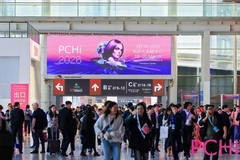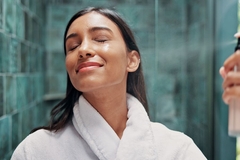International Women’s Day: NGOs urge personal care industry to address period poverty

The personal care industry plays a major role in perpetuating global period poverty, and while some companies have taken strides to reduce the problem, it is far from eradicated. This International Women’s Day, we investigate the issue and speak to non-profits who are calling for action.
According to the UN, period poverty is the inability to afford and access period products, sanitation, hygiene facilities, education, and awareness to manage menstrual health.
“Menstrual products are prohibitively expensive for millions of people worldwide. Gender-blind policies and tax laws – for example, the ‘pink tax’ on feminine products – are in part to blame. Still, such policy decisions go together with the stigma and taboo attached to menstruation,” says the UN Women organization.

The “pink tax” refers to products marketed toward women being more expensive than those marketed toward men. The World Economic Forum found that, on average, personal care products targeted to women were 13% more expensive than comparable men’s products.
In many states within the US, Viagra (for erectile dysfunction) is classified as a tax-exempt health product, while sanitary products are classified as luxury goods and taxed at the highest rate.
Personal Care Insights speaks to Tina Leslie, founder of Freedom4Girls and a spokesperson from Period, an organization promoting menstrual equity, about how the personal care industry can battle period poverty and how the inaccessibility is often exacerbated during geopolitical crises.
Leslie says that while the personal care industry has taken steps to address period poverty, “there is still much more to be done.”
Industry impact
Some brands, such as Always and The Body Shop, have made efforts to tackle menstrual product inaccessibility by launching donation programs that provide free sanitation products to those in need.
 Freedom4Girls suggests providing resuable period products to those in need.There are also companies funding education campaigns to reduce the stigma around menstruation and brands developing more affordable and sustainable products, such as reusable pads and menstrual cups.
Freedom4Girls suggests providing resuable period products to those in need.There are also companies funding education campaigns to reduce the stigma around menstruation and brands developing more affordable and sustainable products, such as reusable pads and menstrual cups.
“Period care companies and manufacturers are being made increasingly aware of the issue of period poverty. Many have responded accordingly, with increased period product donations and/or general awareness campaigns,” a Period spokesperson tells us.
However, Leslie at Freedom4Girls notes that the industry also contributes to the problem, citing some companies’ lobbying against legislation that would make period products more accessible.
She also critiques period brands’ focus on marketing and PR rather than systemic solutions.
“High prices for menstrual products make them inaccessible for many, especially in low-income communities.”
Leslie recommends that these brands reduce their product costs or introduce budget-friendly ranges that maintain quality. She says that improving sustainability by investing in eco-friendly, reusable menstrual products is a long-term solution to making period products more affordable.
“[Period product companies should] advocate for policy change, support government initiatives to provide low-paid workers with menstrual products, and improve distribution in schools and shelters. [They should also] increase accessibility by partnering with NGOs and governments to provide free products in schools, workplaces, and public spaces,” she adds.
The Period spokesperson encourages the personal care industry to continue or begin deeply investing in the menstrual equity space, “as millions of women and girls around the world lack access to the resources they need to manage their periods.”
Government intervention
On the regulatory front, Leslie suggests companies should be required to contribute a portion of sales to period poverty initiatives to help mitigate the problem.
Meanwhile, schools should provide comprehensive menstrual health education to reduce stigmas, and there should be more government funding for free period products. Some girls in The Gambia missing out on a month and a half of school yearly because they cannot afford or access to period products.
Some girls in The Gambia missing out on a month and a half of school yearly because they cannot afford or access to period products.
“[The government should provide] infrastructure improvements such as clean water and sanitation facilities as well as support for local businesses to produce affordable, sustainable menstrual products,” she says.
“Homeless people and low-income populations in wealthy nations are majorly affected by period poverty. Even in developed countries, menstrual products remain expensive and inaccessible for many.”
The Period spokesperson echoes Leslie’s point: “Ending period poverty in our lifetime requires solving the immediate and systemic problem of period poverty. Beyond the distribution or donation of period products, laws must be passed that mandate free and accessible period products in public places (schools, shelters, prisons, government buildings) and end any remaining sales tax that exists on these essential medical items.”
According to the UN, in The Gambia, some girls skip school for five days every month because they cannot afford or access menstrual products and sanitary facilities — this equals missing out on a month and a half of learning every year.
“In many countries, girls fall so far behind in schoolwork that they drop out of school entirely. When girls and women lose their chance at education, they lose life-long opportunities for employment, to fulfill their potential, and to contribute to our world on an equal footing to men,” says UN Women.
Crisis of access
Humanitarian aid in the form of essential products is sent to those impacted during times of conflict. However, period supplies are often not included in these kits, as they are deemed non-essential.
According to a UN Women report last year, over one million women and girls in Gaza had almost no food and no access to safe water, latrines, washrooms, or sanitary pads, with disease growing amidst “inhumane living conditions.”
The Period spokesperson underscores that period poverty is most prevalent where access to safe and clean water is at a greater risk.
“Women, girls, and people who menstruate are always disproportionately impacted by violence. Displaced communities need their basic needs met (water, food, shelter), but personal care/hygiene items (soap, period products) must also be considered as a basic need.”
 There are many societal taboos surrounding menstruation. Since period products are not prioritized in aid shipments, severe shortages can occur during conflicts when supply chains are disrupted. Additionally, rising prices make menstrual products unaffordable for many.
There are many societal taboos surrounding menstruation. Since period products are not prioritized in aid shipments, severe shortages can occur during conflicts when supply chains are disrupted. Additionally, rising prices make menstrual products unaffordable for many.
“Refugee camps often lack access to menstrual hygiene facilities and products. Governments should include menstrual health in crisis response policies. International organizations like the UN should ensure period products are included in humanitarian aid,” says Leslie.
“Companies should also donate menstrual products as part of this aid.”
Cultural taboo
Moreover, cultural taboos still exist in crisis settings, and these stigmas may prevent women from openly seeking help.
The Period spokesperson adds: “Period poverty is often exacerbated by period stigma. Therefore, in places with deep period stigma and misinformation, more of the communities’ population will be impacted by period poverty.”
Leslie explains that the personal care industry can help alleviate these issues by participating in emergency response initiatives and collaborating with NGOs to ensure the reliable distribution of period products.













